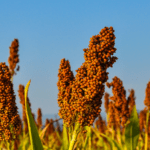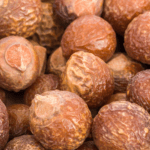
All about Sprouting! How & Why?
The sprouting process of grains involves soaking and germinating seeds until they develop into small plants. This ancient practice has gained traction in modern times due to its numerous health benefits and improved nutritional profile. In this comprehensive review, we delve into the science behind the sprouting process, its transformative effects on grains, and the nutritional advantages it offers.
The Science of Sprouting
Sprouting begins with soaking grains in water, which initiates the germination process. During germination, enzymes within the grain are activated, breaking down complex nutrients into simpler forms that are easier for the body to absorb. As the seed sprouts, its nutrient content undergoes significant changes, leading to enhanced nutritional value compared to unsprouted grains.
Soaking
The sprouting process typically begins with soaking whole grains or seeds in water for a specified period, usually ranging from several hours to overnight. This initial step helps to hydrate the grains and activate enzymes within them, preparing them for germination.
Germination
After soaking, the grains are drained and left to germinate in a warm, humid environment. During germination, the seed begins to sprout, triggering biochemical changes within it. As the seed absorbs water and swells, enzymes become activated, initiating various metabolic processes.
Enzymatic Activity
Enzymes within the seed, such as amylase, protease, and lipase, become active during germination. These enzymes play crucial roles in breaking down complex nutrients stored within the seed, including starches, proteins, and lipids, into simpler forms that are more readily absorbed by the developing plant.
Nutrient Changes
As germination progresses, there are notable transformations in the nutrient composition of the sprouted grains like reduction in anti-nutrients, increased vitamins and enzymes, and enhanced protein quality.
Sprout Development
As the seed continues to germinate, a small sprout emerges from it, signaling the completion of the sprouting process. At this stage, the sprouted grains are typically harvested, dried, and processed into various products such as sprouted flour, bread, cereals, and snacks.
Nutritional Changes in Sprouted Grains & Pulses
Let’s delve into the nutritional changes that occur during the sprouting process of grains, along with examples of specific nutrients affected:
Increased Bioavailability of Nutrients
Phytic Acid Reduction: Phytic acid, present in grains, binds to minerals like iron, zinc, and calcium, inhibiting their absorption. During sprouting, enzymes break down phytic acid, reducing its levels and enhancing the availability of these minerals for absorption.
Example: Sprouted grains, such as sprouted wheat or barley, show reduced phytic acid levels compared to their unsprouted counterparts, facilitating better mineral absorption.
Enhanced Protein Quality
Amino Acid Profile: Sprouting modifies the composition of proteins, increasing the proportion of certain amino acids, particularly lysine, methionine, and cysteine. These essential amino acids are vital for protein synthesis and various metabolic functions in the body.
Example: Sprouted legumes like mung beans or chickpeas exhibit improved protein quality, with higher levels of essential amino acids, making them valuable sources of plant-based protein
Increased Vitamin Content
B Vitamins: Sprouting enhances the levels of B vitamins, including folate (B9), riboflavin (B2), niacin (B3), and thiamine (B1). These vitamins play crucial roles in energy metabolism, DNA synthesis, and nervous system function.
Example: Sprouted grains like wheat or millet show increased folate levels after sprouting, contributing to better cellular function and overall health.
Activation of Enzymes
Enzymatic Activity: Sprouting activates enzymes such as amylase, protease, and lipase, which break down complex nutrients into simpler forms. This enzymatic activity enhances the digestibility and bioavailability of nutrients present in sprouted grains.
Example: Sprouted quinoa or buckwheat contains higher levels of activated enzymes, aiding in the digestion and absorption of carbohydrates, proteins, and fats.
Presence of Bioactive Compounds
Antioxidants: Sprouting increases the levels of antioxidants such as flavonoids, phenolic compounds, and tocopherols, which help neutralize harmful free radicals and reduce oxidative stress in the body.
Example: Sprouted brown rice or amaranth contains elevated levels of antioxidants, contributing to cellular protection and disease prevention.
Reduction of Anti-nutrients
Phenolic Compounds: Sprouting reduces the levels of phenolic compounds, which can inhibit nutrient absorption and contribute to digestive issues.
Example: Sprouted oats or barley exhibit lower levels of phenolic compounds compared to unsprouted varieties, promoting better nutrient utilization and gut health.
The sprouting process induces significant nutritional changes in grains, seeds, and legumes, leading to enhanced bioavailability of nutrients, improved protein quality, increased vitamin content, activation of enzymes, and reduction of anti-nutrients. Examples such as sprouted wheat, mung beans, quinoa, brown rice, and oats showcase these nutritional transformations, making sprouted grains valuable additions to a balanced and nutrient-rich diet. Incorporating sprouted grains into your meals can offer numerous health benefits and contribute to overall well-being.
Spro
Consuming sprouted grain flours can have several health impacts due to their unique nutritional profile and potential benefits. Here are some of the key health impacts associated with consuming sprouted grain flours:
Improved Digestibility
Sprouting breaks down complex carbohydrates and proteins into simpler forms, making them easier to digest. This can be particularly beneficial for individuals with digestive issues or sensitivities to certain grains.
Enhanced Nutrient Absorption
Sprouting increases the bioavailability of nutrients such as vitamins, minerals, and antioxidants. This means that the body can more effectively absorb and utilize these essential nutrients, promoting overall health and well-being.
Higher Nutrient Content
Sprouted grain flours typically have higher levels of vitamins, minerals, and phytonutrients compared to unsprouted grains. For example, sprouted grains may contain increased amounts of B vitamins, vitamin C, folate, and essential minerals like iron and zinc.
Increased Enzyme Activity
Sprouting activates enzymes within the grains, which can aid in digestion and nutrient absorption. Enzymes such as amylase, protease, and lipase help break down carbohydrates, proteins, and fats, respectively, facilitating the digestion process.
Lower Glycemic Index
Sprouted grain flours have a lower glycemic index compared to their unsprouted counterparts. This means that they cause a slower and more gradual increase in blood sugar levels after consumption, which can help regulate blood sugar and insulin levels.
Rich in Fiber
Sprouted grain flours are typically high in dietary fiber, which is important for digestive health, weight management, and heart health. Fiber helps promote satiety, regulate bowel movements, and lower cholesterol levels.
Potential Antioxidant Benefits
Sprouted grains contain increased levels of antioxidants, which help protect cells from damage caused by free radicals. Antioxidants play a role in reducing inflammation, supporting the immune system, and reducing the risk of chronic diseases.
Gluten-Free Options
Some sprouted grain flours, such as sprouted quinoa or sprouted brown rice flour, are naturally gluten-free. This makes them suitable options for individuals with gluten sensitivities or celiac disease who need to avoid gluten-containing grains like wheat, barley, and rye.
Supportive of Gut Health
The fiber and prebiotics found in sprouted grains can support a healthy gut microbiome. Prebiotics are types of fiber that feed beneficial bacteria in the gut, promoting a balanced and diverse microbial environment.
Potential Weight Management Benefits
- Due to their high fiber content and lower glycemic index, sprouted grain flours may help promote feelings of fullness and satiety, which can support weight management efforts when included as part of a balanced diet.
- In conclusion, consuming sprouted grain flours can contribute to improved digestive health, enhanced nutrient absorption, and overall well-being. However, it’s essential to incorporate them as part of a varied and balanced diet, along with other nutritious foods, to maximize their health benefits.
References in Science Papers
Sprouted flours offer several benefits. They contain higher levels of bioactive compounds such as γ-aminobutyric acid (GABA) and total soluble phenolic compounds (TSPC), as well as increased antioxidant activity (AA) compared to wholegrain or refined flours1, 2. Sprouting also reduces the content of anti-nutritional compounds like phytic acid (PA)3,4,5. Incorporating sprouted flours into baked products, such as biscuits, bread, and cakes, improves their nutritional profile by increasing protein, fat, energy, and β-glucan content. The use of sprouted flours in bread production results in better rheological properties, higher specific volume, and improved sensory acceptability. Additionally, sprouts have high concentrations of vitamins and minerals, and their consumption is associated with various health benefits. Overall, the use of sprouted flours in food products enhances their nutritional value and sensory properties.
Frequently Asked Questions on Sprouted Flours
How do you use sprouted flours in baking?
Sprouted flours can generally be used in place of regular flours in most recipes. However, they may absorb more liquid, so it’s advisable to adjust the amount of liquid in the recipe accordingly.
Do sprouted flours taste different?
Sprouted flours may have a slightly sweeter and nuttier flavor compared to traditional flours. Some people also find them to be lighter and easier to digest.
How should sprouted flours be stored?
Sprouted flours should be stored in a cool, dry place, preferably in an airtight container to prevent moisture and pests. They can also be stored in the refrigerator or freezer for longer shelf life.
Do sprouted flours retain their nutritional benefits when heated in baking or cooking?
While some nutrient loss may occur during the heating process, sprouted flours generally retain many of their nutritional benefits, including increased bioavailability of nutrients and enzymes.
How are Dhatu’s Sprouted Flours different from other Sprouted Flours?
Our sprouted flours are made in small batches. The sprouted grains are dried at a lower temperature and then cold-milled to retain the maximum nutrition. Dhatu Sprouted flours offer maximum nutritional benefits possible to the consumers.
Are sprouted flours more expensive than regular flour?
Yes, sprouted flours tend to be more expensive than regular flour due to the additional steps involved in their production, such as sprouting and drying. However, some people find the nutritional benefits worth the extra cost.
Luz, María, Paucar-Menacho., Wilson, Daniel, Símpalo-López., Williams, Esteward, Castillo-Martinez., Lourdes, Esquivel-Paredes., Cristina, Martínez-Villaluenga. Improving Nutritional and Health Benefits of Biscuits by Optimizing Formulations Based on Sprouted Pseudocereal Grains. Foods, (2022). doi: 10.3390/foods11111533 ↩︎
Luz, María, Paucar-Menacho., Wilson, Daniel, Símpalo-López., Williams, Esteward, Castillo-Martinez., Lourdes, Esquivel-Paredes., Cristina, Martínez-Villaluenga. Reformulating Bread Using Sprouted Pseudo-cereal Grains to Enhance Its Nutritional Value and Sensorial Attributes. Foods, (2022). doi: 10.3390/foods11111541 ↩︎
Muhammad, Thaufiq, Abdullah., Tabussam, Tufail., Muzzamal, Hussain., M., Nadeem., Muhammad, Owais., M., Zulkiffal., Muhammad, Hammad, Tanveer., Entessar, Al, Jbawi. Effect of sprouted barley flour on the quality wheat of bread, biscuits and cakes. (2022). doi: 10.1080/23311932.2022.2122272 ↩︎
N, Naumenko., Irina, Potoroko., Irina, V., Kalinina., R., Fatkullin., Eva, Ivanišová. The Influence of the Use of Whole Grain Flour from Sprouted Wheat Grain on the Rheological and Microstructural Properties of Dough and Bread.. International journal of food science, (2021). doi: 10.1155/2021/7548759 ↩︎
Boris, Nemzer., Fadwa, Al-Taher. Analysis of Fatty Acid Composition in Sprouted Grains. Foods, (2023). doi: 10.3390/foods12091853 ↩︎
Tags: sprouted food, sprouting
Facebook
Twitter
LinkedIn
WhatsApp
Discover more from Dhatu
Subscribe to get the latest posts sent to your email.




